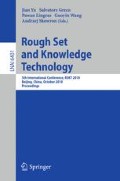Abstract
Concept hierarchy is an integral part of ontology which is the backbone of the Semantic Web. This paper describes a new hierarchical clustering algorithm for learning concept hierarchy named Clonal Selection Algorithm for Learning Concept Hierarchy, or CLONACH. The proposed algorithm resembles the CLONALG. CLONACH’s effectiveness is evaluated on three data sets. The results show that the concept hierarchy produced by CLONACH is better than the agglomerative clustering technique in terms of taxonomic overlaps. Thus, the CLONALG based algorithm has been regarded as a promising technique in learning from texts, in particular small collection of texts.
Access this chapter
Tax calculation will be finalised at checkout
Purchases are for personal use only
Preview
Unable to display preview. Download preview PDF.
References
Gulla, J.A., Brasethvik, T.: A Hybrid Approach to Ontology Relationship Learning. In: Kapetanios, E., Sugumaran, V., Spiliopoulou, M. (eds.) NLDB 2008. LNCS, vol. 5039, pp. 79–90. Springer, Heidelberg (2008)
de Castro, L., Von Zuben, F.J.: Learning and Optimization Using the Clonal Selection Principle. IEEE Transactions on Evolutionary Computation 6(3) (2002)
Han, J., Fu, Y.: Dynamic Generation and Refinement of Concept Hierarchies for Knowledge Discovery in Databases. In: Workshop on Knowledge Discovery in Databases (AAAI 1994). AAAI, Burnaby (1994)
Drumond, L., Girardi, R.: A Survey of Ontology Learning Procedures. In: Freitas, F.L.G.d., et al. (eds.) The 3rd Workshop on Ontologies and their Applications, Salvador, Bahia, Brazil, October 26. CEUR-WS.org (2008)
Harris, Z.: Mathematical Structure of Language. Wiley, Chichester (1968)
Cimiano, P., et al.: Comparing conceptual, divisive and agglomerative clustering for learning taxonomies from text. In: Proceedings of the European Conference on Artificial Intelligence, ECAI (2004)
Schickel-Zuber, V., Faltings, B.: Using hierarchical clustering for learning the ontologies used in recommendation systems. In: International Conference on Knowledge Discovery and Data Mining 2007, pp. 599–608. ACM, San Jose (2007)
Reinberger, M.-L., Daelemans, W.: Is Shallow Parsing Useful for Unsupervised Learning of Semantic Clusters? In: Computational Linguistics and Intelligent Text Processing, pp. 24–34. Springer, Heidelberg (2010)
de Castro, L.N., Timmis, J.: Artificial Immune Systems: A New Computational Intelligence Approach. Springer, Heidelberg (2002)
de Castro, L.N., Zuben., F.v.: The clonal selection algorithm with engineering applications. In: Proceedings of Genetic and Evolutionary Computation, Las Vegas, USA (2000)
Secker, A., et al.: An Artificial Immune System for Clustering Amino Acids in the Context of Protein Function Classification. Journal of Mathematical Modelling and Algorithms 8(2), 103–123 (2009)
Zhang, C., Yi, Z.: Tree structured artificial immune network with self-organizing reaction operator. Neurocomputing 73(1-3), 336–349 (2009)
Hamzah, M.P., dan Hubungan, F., Dalam, S., Pengetahuan, P.: kesan Terhadap Keberkesanan Capaian Dokumen Melayu. In: Information Science, p. 214. Universiti Kebangsaan Malaysia, Bangi (2006)
Nazri, M.Z.A., et al.: An Exploratory Study on Malay Processing Tool for Acquisition of Taxonomy Using FCA. In: Eighth International Conference on Intelligent Systems Design and Applications, ISDA 2008 (2008)
Cimiano, P.: Ontology Learning and Population from Text. Springer, Berlin (2006)
Salton, G., McGill, M.J.: Introduction to Modern Information Retrieval. McGraw Hill, New York (1983)
Caraballo, S.A.: Automatic construction of a hypernym-labeled noun hierarchy from text. In: 7th Annual Meeting of the Association for Computational Linguistics, College Park, Maryland. ACM, New York (1999)
Cimiano, P., Staab, S.: Learning Concept Hierarchies from Text with a Guided Agglomerative Clustering Algorithm. In: International Conference on Machine Learning, ICML 2005, Bonn Germany (2005)
Gomez-Perez, A., et al.: Ontological Engineering, 4th edn., p. 416. Springer, New York (2005)
Author information
Authors and Affiliations
Editor information
Editors and Affiliations
Rights and permissions
Copyright information
© 2010 Springer-Verlag Berlin Heidelberg
About this paper
Cite this paper
Nazri, M.Z.A., Shamsuddin, S.M., Bakar, A.A. (2010). Clonal Selection Algorithm for Learning Concept Hierarchy from Malay Text. In: Yu, J., Greco, S., Lingras, P., Wang, G., Skowron, A. (eds) Rough Set and Knowledge Technology. RSKT 2010. Lecture Notes in Computer Science(), vol 6401. Springer, Berlin, Heidelberg. https://doi.org/10.1007/978-3-642-16248-0_64
Download citation
DOI: https://doi.org/10.1007/978-3-642-16248-0_64
Publisher Name: Springer, Berlin, Heidelberg
Print ISBN: 978-3-642-16247-3
Online ISBN: 978-3-642-16248-0
eBook Packages: Computer ScienceComputer Science (R0)

